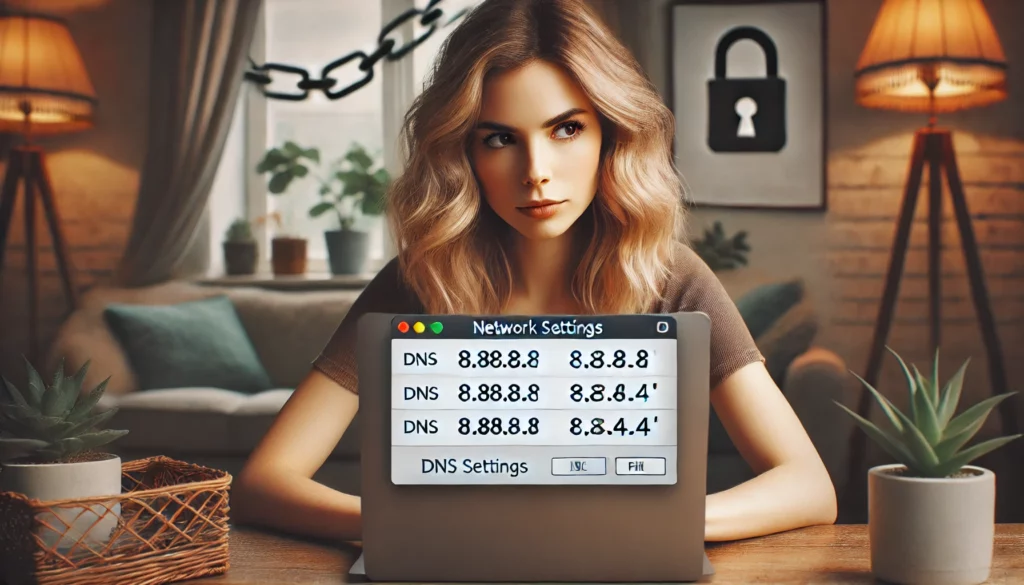
In today’s world, evading internet censorship has become essential for many who seek unrestricted access to information. One of the most effective and easy-to-implement solutions is changing your device’s DNS to Google’s: 8.8.8.8 and 8.8.4.4. But before we dive into how to do it, let’s explain what a DNS is and why Google offers this option.
What is a DNS?
A DNS (Domain Name System) is like the phonebook of the internet. Imagine you want to visit a website, like www.loquesigue.tv. What you’re really doing is asking your browser to find a specific IP address, similar to dialing a phone number for that website. The DNS is what translates the domain name (loquesigue.tv) into that IP address so your browser knows where to take you.
Without a DNS, you’d have to memorize long strings of numbers (IP addresses) for every site you visit. So, basically, a DNS makes the internet more user-friendly.
Why Use Google’s DNS?
Google launched its Public DNS services (8.8.8.8 and 8.8.4.4) in 2009, and they’ve become a popular option for those seeking a fast, reliable, and secure browsing experience. Here are a few reasons why you might consider using them:
- Speed: Google’s DNS is designed to be fast. Google uses its global network of servers to ensure that requests are resolved as quickly as possible, which can make web pages load faster.
- Privacy and Security: While they don’t offer the same level of privacy as Cloudflare’s DNS (1.1.1.1), Google does implement robust security measures to protect you from attacks like DNS “spoofing,” where attackers try to redirect your queries to malicious sites.
- Evading Censorship: In many countries, Internet Service Providers (ISPs) block certain websites for political, cultural, or legal reasons. Changing your DNS to Google’s can help you bypass those blocks and access restricted content.
How to Configure Google DNS (8.8.8.8 and 8.8.4.4)
On Windows:
- Open the Control Panel and go to “Network and Internet.”
- Click on “Network and Sharing Center” and select “Change adapter settings.”
- Right-click on your active connection and select “Properties.”
- Select “Internet Protocol Version 4 (TCP/IPv4)” and click on “Properties.”
- Select “Use the following DNS server addresses” and enter
8.8.8.8as the Preferred DNS server and8.8.4.4as the Alternate DNS server.
On Mac:
- Go to “System Preferences” and select “Network.”
- Select your active connection (Wi-Fi or Ethernet) and click “Advanced.”
- Go to the DNS tab and add
8.8.8.8and8.8.4.4to the list of servers.
On Mobile Devices:
- iPhone/iPad:
- Open “Settings” and select “Wi-Fi.”
- Tap the “i” next to your network and select “Configure DNS.”
- Switch to “Manual” and add
8.8.8.8and8.8.4.4.
- Android:
- Go to “Settings” and select “Network & Internet.”
- Tap “Wi-Fi,” select your network, then “Advanced options.”
- Change “IP settings” to “Static” and add
8.8.8.8and8.8.4.4in the DNS section.
On Your Router:
- Access your router’s settings (usually by entering
192.168.1.1in your browser). - Find the DNS section and change the entries to
8.8.8.8and8.8.4.4. - Save the changes and restart your router.
Examples of Using Google DNS to Evade Censorship
| Country | Censorship Context | Use of Google DNS | Outcome |
|---|---|---|---|
| China | The Great Firewall of China blocks many foreign sites, including Google, YouTube, and Facebook. | Users and activists have used Google’s DNS to attempt to access blocked sites. | In some cases, this has temporarily bypassed blocks, though the Chinese government continuously updates its censorship methods. |
| Turkey | In 2014, the government blocked Twitter and YouTube after recordings implicating officials in corruption were released. | Many citizens switched their DNS to Google’s (8.8.8.8) to access these platforms. | The measure was effective short-term, allowing the population to access social media until the government implemented additional blocks. |
| Iran | The Iranian government regularly blocks news sites and social media to control information flow. | Iranian citizens have used Google DNS to attempt to access international news sites and social media platforms like Facebook. | Initially, this tactic was successful, but Iranian authorities responded by blocking IP addresses associated with Google’s DNS. |
| Pakistan | In 2010, the government blocked Facebook for containing content considered blasphemous. | Users changed their DNS to Google’s to bypass the block and continue accessing the platform. | This solution allowed users to evade censorship temporarily, until authorities took further measures to restrict access. |
| Venezuela | Amid political and economic crises, the government has blocked news sites and social media on several occasions. | Citizens switched to Google’s DNS to access content blocked by the government, such as international news platforms. | In many cases, this allowed access to censored sites, but also prompted a government response to implement more sophisticated blocking techniques. |
Conclusion
Google’s DNS, 8.8.8.8 and 8.8.4.4, not only enhance your browsing speed and security but also offer an effective way to evade internet censorship. Setting them up is simple, and once you do, you’ll have access to a more open and unrestricted internet. Ready to try it out?
